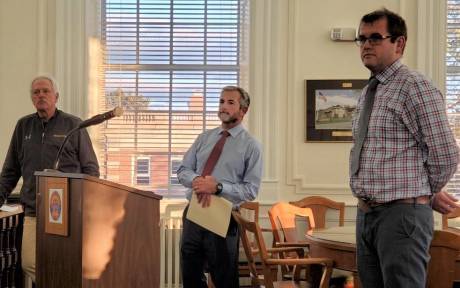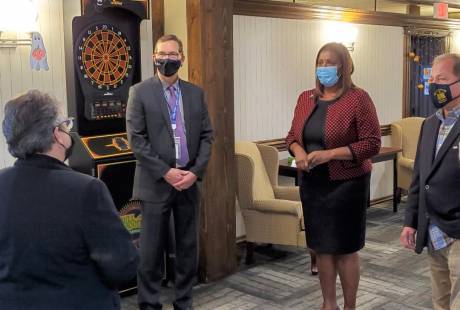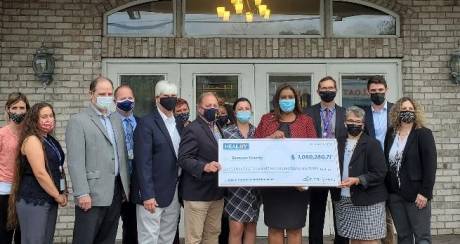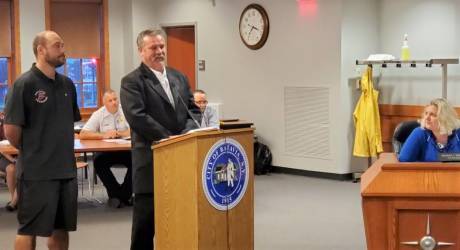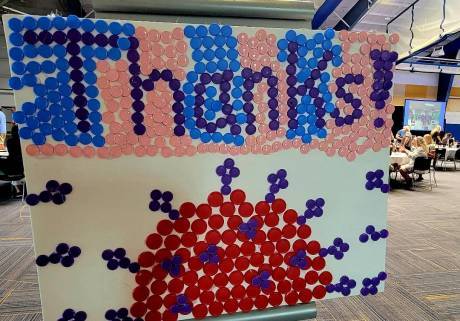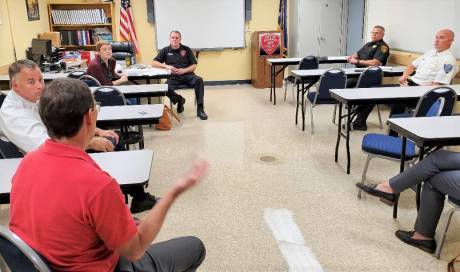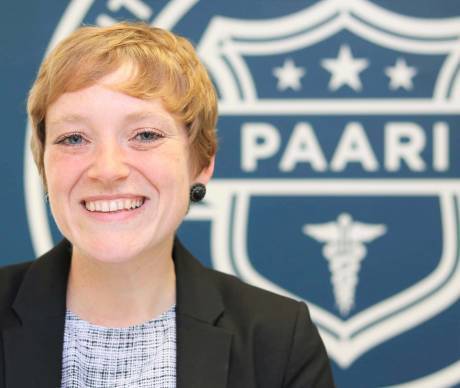With attendance of more than 625,000 and wagers approaching $700 million this year alone, Batavia Downs Gaming has established itself as a regional pastime and -- as the driving force behind Western Regional Off-Track Betting Corp. -- a significant source of revenue for Genesee County and the 16 other municipalities that it serves.
Gaming in Batavia is at a fever pitch, said Jacquelyne Leach, chief financial officer for WROTB, the public benefit company that owns the Park Road gaming and harness horse racing track as well as The Hotel at Batavia Downs.
---------------
Genesee’s WROTB Director Addresses Recent Issues
---------------
“We’re anticipating record third-quarter earnings distributions of about $3 million, and we’re not done closing out September numbers,” Leach said. “When you add in the $1.2 million in earnings distributions from the first two quarters, this year is going to approach the $4.4 million generated in 1995 – and that was during the heyday of pari-mutuel wagering at OTB parlors.”
Although harness racing’s popularity has decreased over time – it once was the only “game” in town -- the sport serves a vital purpose in the overall scheme of things, Leach pointed out.
“As of right now, we have to have a valid racing license to secure our video gaming license,” she said. “If you don’t have a racing license (through the New York Gaming Commission), you can’t have a video gaming license.”
WROTB operates 27 off-track betting branches, 26 E-Z Bet locations and a telephone wagering service in 15 Western New York counties. As dictated by legislation, it contributes a portion of earnings plus surcharges to those counties and the cities of Buffalo and Rochester.
Leach said municipalities also earn monthly revenue from what is known as surcharge. Thus far in 2021, more than $450,000 have gone out in surcharges with another $130,000 or so expected for the third quarter, she advised.
$109,000 TO GENESEE COUNTY IN 2021
Genesee County will receive approximately $93,000 in earnings and $16,000 in surcharge for 2021, Leach predicted, adding to the nearly $13 million it has received from WROTB revenue since 1974. The other GLOW counties of Livingston, Orleans and Wyoming are among the member municipalities.
In her 33rd year at the Downs, Leach explained that 5 percent of winning wagers made at WROTB/E-Z Bet locations is distributed to the member municipalities based on the member’s “proportionate handle and population to WROTB as a whole.”
“For wagers placed at racetracks within New York State, 50 percent of the surcharge is distributed to the municipalities in which the racetrack is located (in this case, Genesee County) and 50 percent is distributed to the other participating member municipalities,” she said.
All of these distributions are separate from what Batavia Downs Gaming generates in sales taxes that go into Genesee County’s coffers.
“Things are really ramping up,” Leach said, reasoning that people are staying closer to home to whet their gambling appetites. “Since COVID, people aren’t traveling as much to Las Vegas. It’s more of a localized, 2-2 ½ hour drive. So, we’ve become a regional destination.”
The Bennington resident said the corporation keeps about 8 percent of the total played at the Video Lottery Terminals at Batavia Downs Gaming and through Inter Track Wagering, which, from 2001-2020, totaled a staggering $8.45 billion.
“Generally speaking, patrons have about a 92 percent chance of winning, with pari-mutuel (OTB branches, etc.) bettors having about a 75 percent chance of winning,” she said.
LEACH: ‘FOCUSED ON TASK AT HAND’
Calling it “an incredible turnaround from 2020,” Leach credited the Batavia Downs Gaming staff for creating a welcoming atmosphere.
“I can’t say enough good about the WROTB staff. Our employees work hard and are dedicated. They definitely are our best assets,” she said.
The corporation lists 385 full- and part-time employees, Leach said, with an annual payroll of about $12.5 million.
Leach (salary of $157,000) is one of four officers, the others being Scott Kiedrowski, vice president of operations ($119,000); William White, vice president of administration ($119,000), and Henry Wojtaszek, president and chief executive officer ($212,000).
“As part of the upper management team, our responsibilities have grown over the years and, despite a lot of negative stuff, we have stayed focused on the task at hand – to provide a good experience for all who enter Batavia Downs Gaming,” Leach said. “We want them to come back and have a great time here. And I think that we’re very customer service oriented, and I think, that based on the numbers, we’re certainly doing something right.”
The “negative stuff” that she was referring to includes recent audits by the state Comptroller’s Office that pointed to a lack of oversight by WROTB’s board of directors regarding distribution of sporting event tickets and use of a company vehicles from 2016-2019.
Audit findings have prompted Democratic Party leaders in Niagara County to call for criminal investigation into the way the public benefit company is operated.
LAWSUIT BY EX-EMPLOYEE CONTINUES
Additionally, Wojtaszek and Board Chair Richard Bianchi are defendants in a lawsuit by a former WROTB officer Michael Nolan, who claims he was terminated from his job without proper cause, and the board of directors has been maligned in the press for accepting health insurance policies that cost the corporation hundreds of thousands of dollars in annual premiums.
Wojtaszek said the lawsuit is “personally and politically driven” but it won’t deter him and his staff from focusing on “great customer service.”
“That’s why we’ve been successful,” he said.
Concerning the audits, he said WROTB directors asked the Comptroller to conduct it and to provide recommendations.
“We’re following those recommendations; we know that we can always improve,” he said.
On the health insurance issue, he said that the board received “differing opinions on whether or not it is allowed,” but decided to remove it going forward as a “show of good faith to address a situation that kept occurring.”
In June, directors voted unanimously to discontinue giving health insurance to board members appointed after July 1, 2021.
He praised the work of the board, stating that the “fruits of directors’ labor” are the record numbers being achieved.
Leach defended the board as well, noting that they receive just $4,000 per year in salary.
“Really, for such a multifaceted and dynamic corporation? That is dictated by the racing and pari-mutuel statute that was put in place many, many moons ago,” she offered. “Board members haven’t gotten a raise for as long as I have been here, and I’m in my 33rd year.”
CONSOLIDATING OTB BRANCHES
Directors have made forward-thinking decisions, Leach mentioned, notably the purchase of the hotel earlier this year from a private investment group, appropriating necessary funding to the Summer Concert Series and expanding programming and dining options to ensure a multifaceted entertainment venue.
She said directors approved the closing of several OTB branches in an effort to cut losses and streamline the operation.
When asked if the track and OTB parlors have been losing propositions, she acknowledged that in “years past, yes, although I will say that in 2021, our branches are doing much better.”
“We closed six OTB locations in 2020 and a lot of that handle from those six locations has transferred either to Batavia Bets, our online wagering, or to other brick-and-mortar OTB branches or EZ Bet facilities,” she said. “Actually, our branches and E-Z Bets are doing quite well right now.”
She wouldn’t speculate about the future of harness racing, other to say that a shortage of race horses is hurting the industry.
“As far as live racing goes, it’s a very expensive venture,” she said.
Leach said that the corporation is working within “a somewhat antiquated” OTB model developed back in the late 1960s.
“So, we’ve tried to cut costs there by consolidating our branch operations, closing and consolidating our handle, opening the E-Z Bets and opening Batavia Bets (online platform),” she said. “Batavia Bets has been successful ever since we opened it in 2012, but especially when COVID hit. That really took off because it was a way for patrons to wager as nothing was open.”
CONTRIBUTING TO LOCAL CAUSES
Beyond entertainment, wagering and earnings distributions, WROTB is an active contributor to charitable causes.
Marketing Director Ryan Hasenauer said the corporation gives back around $50,000 annually through donations, sponsorships and fundraisers.
“Since the hotel was constructed we have provided hundreds -- and I do mean hundreds -- of certificates for stay and plays for local fundraisers, charity auctions and similar type events,” Hasenauer said. “Those offers include a hotel night, free play and free food and are valued at over $250 each. These are offered as prizes at an organization’s event which they use to raise money for their work. So far this year we’ve given out over 200 of these.”
Hasenauer said organizations that have benefited from WROTB events include Make-A-Wish Gala, the Batavia Police Department K-9 Unit, the Genesee County K-9 Unit, GLOW YMCA, Food Bank of Western New York and the Breast Cancer Coalition of Rochester.
“We have also been a partner with many organizations, firstly as a place for them to hold large fundraising and outreach events,” he said, mentioning Red Cross, Connect Life, Breast Cancer Coalition of Rochester. “And we have partnered with organizations for them to benefit from being a part of our major events.”
He said the summer concerts generated funds for the Alzheimer’s Association, Make A Wish, Genesee County Animal Shelter and others.
File photos: Batavia Downs Gaming entrance on Park Road, The Hotel at Batavia Downs, harness horse racing action, Three Dog Night in concert, contribution to Make A Wish.
